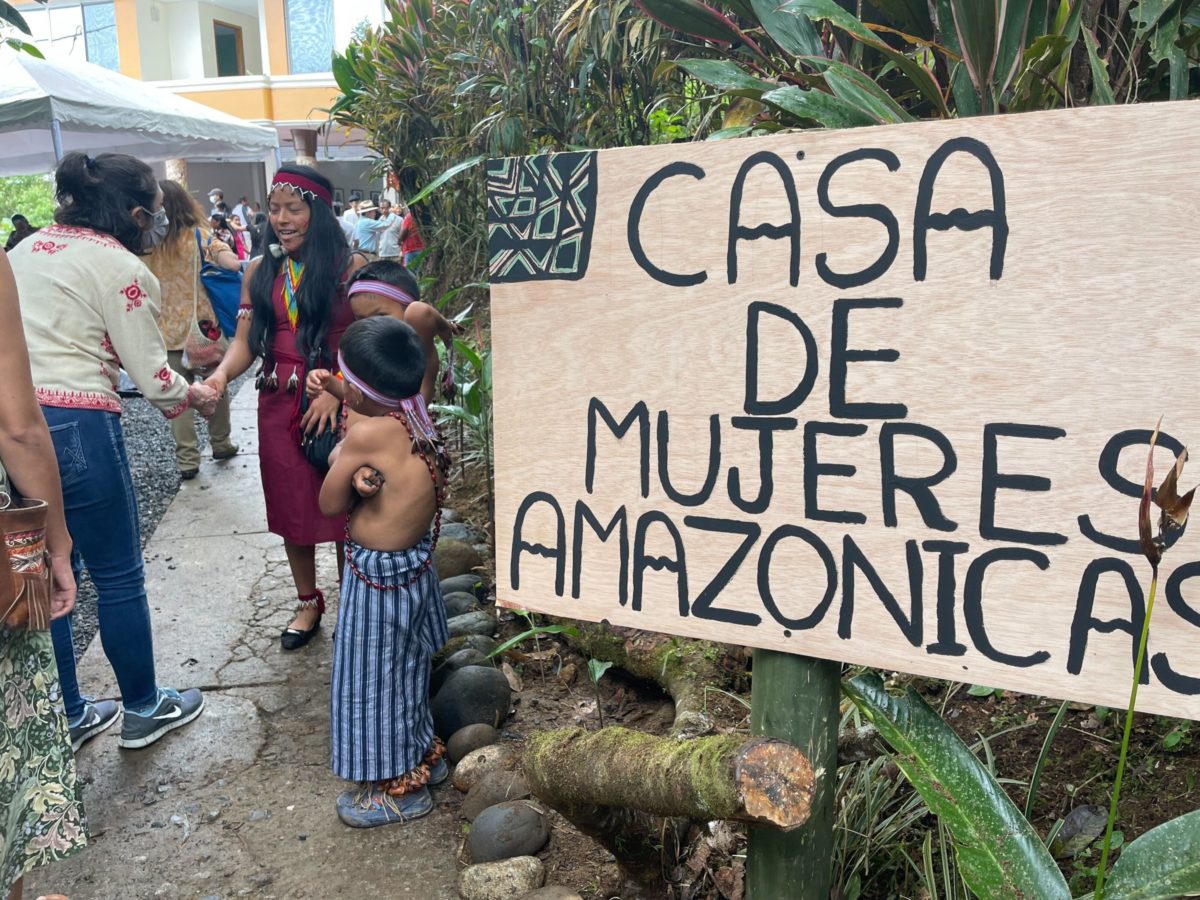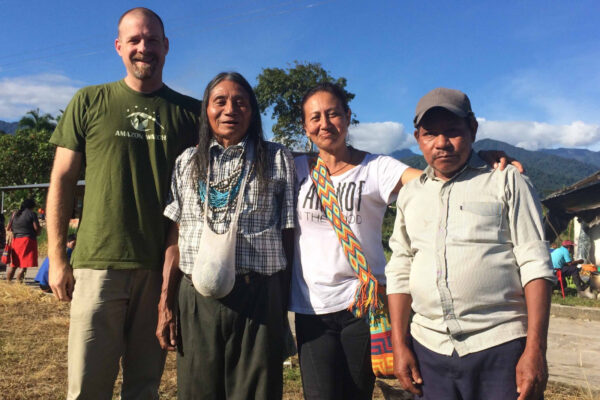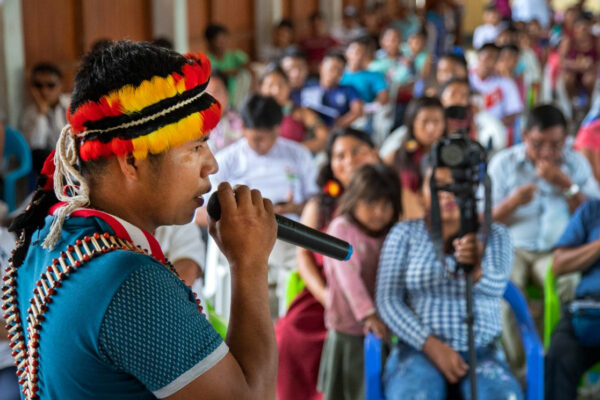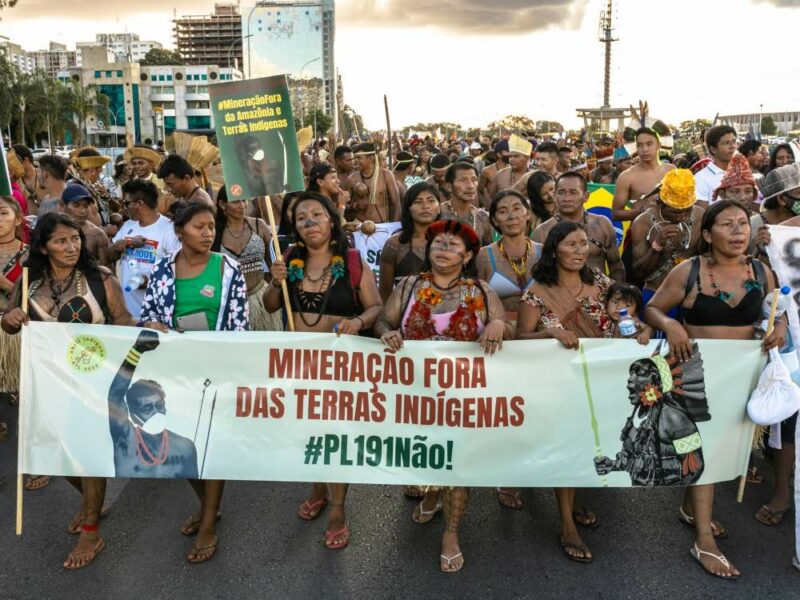“Extractive violence against the land and violence against Indigenous women go hand and hand. We believe that healing women is also healing the earth.”
Nina Gualinga
Over the last few weeks, I traveled with a few of my colleagues from Amazon Watch, including: Sofía Jarrín and Alejandra Yépez (Ecuador team members), Nina Gualinga (Women Defenders Program Coordinator), and Angela Martínez (Amazon Defenders Fund Director). We went to the Ecuadorian Amazon to show solidarity with Indigenous women defenders in a series of events for International Women’s Day and month. It was truly an honor to witness the inauguration of the Casa de Mujeres Amazónicas (Women Defenders of the Amazon House) and the Indigenous women’s march and celebration, and to reconnect with Indigenous women defenders and leaders from across the Ecuadorian Amazon in person after more than two years. I return inspired and filled with hope, love, and gratitude for the strength and courage of these powerful women as they face ever-increasing threats to their lives, land, and bodies due to extraction, patriarchy, and the continuing COVID-19 pandemic. We are honored to support these initiatives via our advocacy programs, Amazon Defenders Fund, and our growing Women Defenders Program.
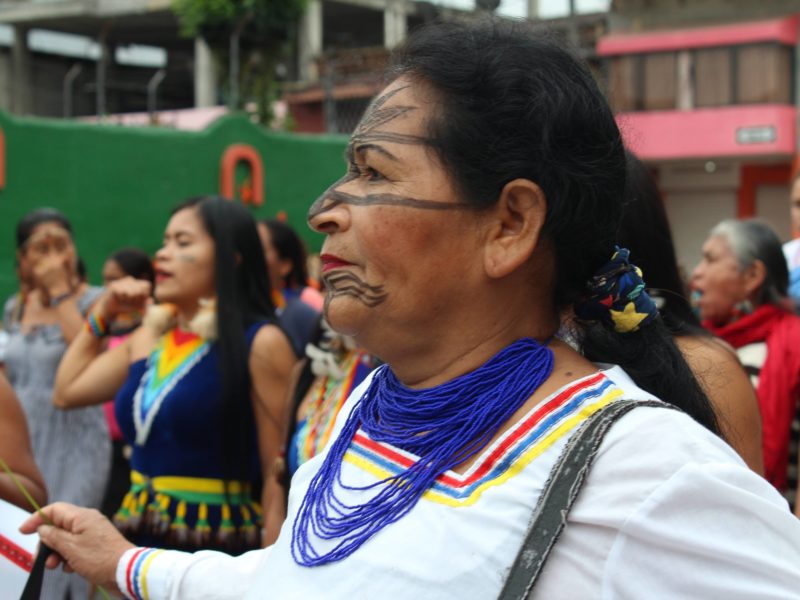
“During the pandemic, many of us almost died, but we didn’t — because we supported each other, because we prepared our medicines from the forest. The forest contains all that we need, our food and our medicines. That is why we take care of the forest and say no to extraction, no to mining, no to logging. That is why we are here as Mujeres Amazónicas. We are not here to negotiate. We are here to unite as women defending the forest,” said Zoila Castillo, Kichwa woman defender from Teresa Mama, Pastaza at the inauguration event of the Casa de Mujeres Amazónicas.
Casa de Mujeres Amazónicas
On March 6, Indigenous women from across the Ecuadorian Amazon traveled to Puyo for the inauguration event of the Casa de Mujeres Amazónicas, a gathering and healing space for Indigenous women defenders of the Amazon. It is a safe space where women can strategize, create, share, and heal together, including work on programming to support women’s economic empowerment. It is also a resting place for women who travel from their villages and communities into the city. The three-story house also has a healing space for traditional medicine treatments, including plants, massage, and acupuncture.
At the inauguration, members of the Mujeres Amazónicas collective welcomed visitors, allies and local authorities. They spoke, sang, danced, and sold traditional food and crafts. It was a celebration of the collective work that they had achieved since first marching together in 2013 and then again in 2018, when they presented their women defenders mandate to then-President Lenin Moreno.
Since then, we have witnessed threats against our sisters’ lives for standing up to government and extractive industry plans to expand oil and mining production on Indigenous lands. We have seen an increase in gender-based violence, including domestic violence and sexual violence against women and girls. We have also witnessed the complete absence of public health support for Indigenous peoples during the COVID-19 pandemic. As Zoila Castillo said above, “Many of us almost died, but we didn’t because we supported each other…” This is the truth. Throughout the last two years, these women have supported each other, their families, and communities, through floods, oil spills, COVID-19, and multiple forms of violence. They are strong and resilient, and they are healing. The Casa de Mujeres Amazónicas is their healing and organizing space.
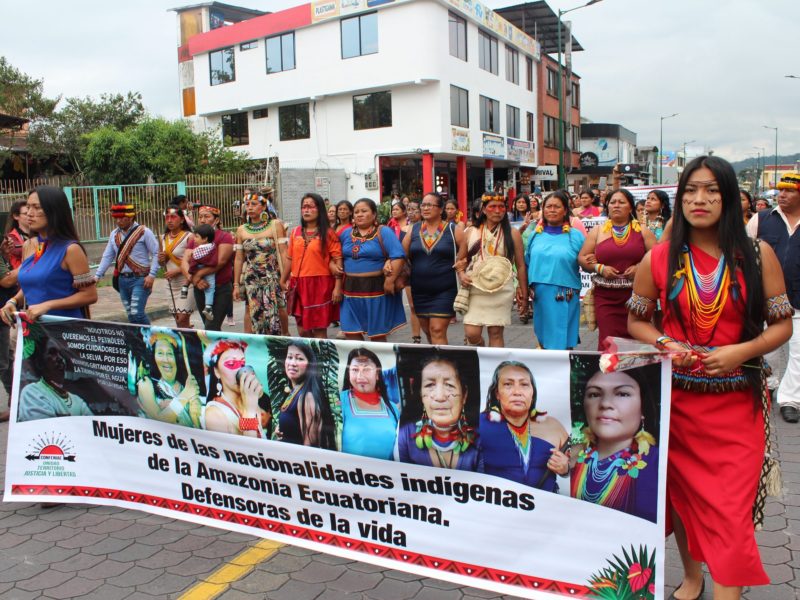
International Women’s Day march and celebration in Puyo, Ecuador
On March 8, International Women’s Day, Indigenous women from across the Ecuadorian Amazon gathered in Puyo, Ecuador for the first time since the pandemic began. Waorani leader Nemo Andy, Women’s Health Director of Confederation of Indigenous Peoples of the Ecuadorian Amazon (CONFENIAE), led women in an early morning guayusa tea ceremony and march with fire torches preceding the public march. Then, approximately 400 Indigenous women from 9 nationalities (Waorani, Kichwa, Shiwiar, Shuar, Achuar, Andoas, Siona, Secoya, Cofan) and allies in solidarity, including Amazon Watch, marched through streets of Puyo to celebrate and honor women and call for respect for rights and territories threatened by oil and mining interests.
The march was led by respected and elected Indigenous women leaders of the 9 nationalities, including Nemo Andy, Lolita Piaguaje (CONFENIAE VP), Josephina Tunki (President of Shuar Arutam Peoples), Isabel Wisum (Achuar VP), Rocio Cerda (President of FOIN, Napo Kichwa Federation), and Alicia Cahuiya (Women’s Director of CONAIE), among many others. They were followed by delegations of Indigenous women, girls, and babies, as well as male allies and Indigenous guards. Mujeres Amazónicas had a strong presence at the march. Catalina Chumpi, Shuar grandmother and leader, led chants including, “Mujeres Unidas, Jamas Seran Vencidas” (Women United, Will Never Be Defeated).
Following the march, nearly 600 women and allies gathered for a summit and celebration at the CONFENIAE headquarters in Union Base. At the summit, CONFENIAE women leaders shared their Public Manifesto of Women of the Amazon Indigenous Peoples.
“March 8th will continue to be needed until we can stop counting femicides, until our history ceases being one of women as victims, and instead becomes a story of women leaders, of women who take up public space, who succeed in their work, in policymaking, in the creation and transformation of our society, an occasion to remember and pay homage to the women who came before us.
“The full and effective public participation of women in public life and in decision-making roles, and the end of violence against them, are essential to achieving gender equality and the empowerment of women and girls. This is key to taking action [to protect] the Amazon.”
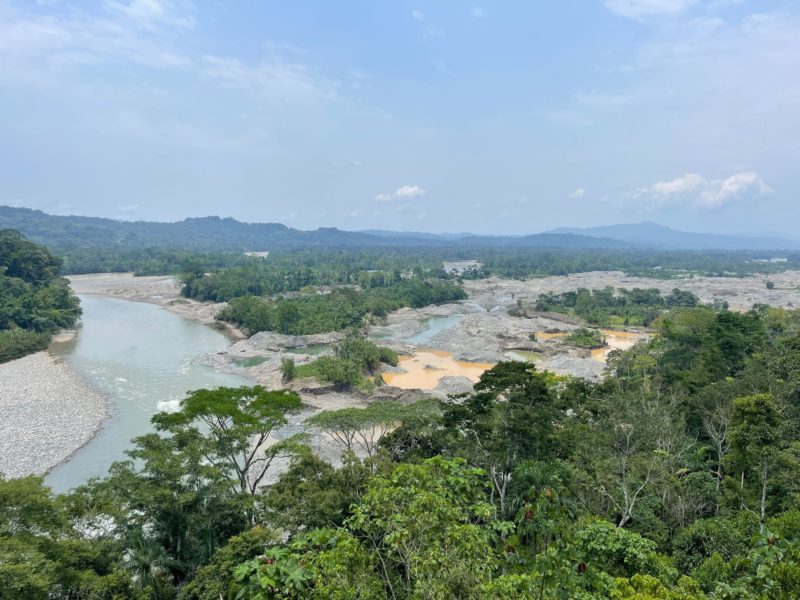
Indigenous women lead resistance to mining across the Amazon
Following the events in Puyo, we were invited to accompany Indigenous women defenders Rocio Cerda (Kichwa) and Josefina Tunki (Shuar) to their territories impacted by mining. In response to the call to end mining activities and attacks on Earth defenders by FOIN (Federation of Indigenous Organizations of Napo), we traveled to the Napo province where we visited the Kichwa communities of Yutzupino and La Serena.
The Napo is the headwaters of the Amazon and is known for its invaluable beauty and bio-cultural diversity. For decades the Napo’s beauty and diversity attracted local, national and international visitors, who supported ecological and community-based tourism and economic development. In 1995, I was one of those visitors when I volunteered at the Jatún Sacha (Big Forest) biological station. It was there that I began my work in defense of the Amazon and Indigenous rights. I never imagined it would face the threats it faces today.
Today, illegal mining has invaded the Napo province, causing deforestation, destruction and division. In the last 6 months, thousands of gold miners descended upon the Kichwa community of Yutzupino along the Napo River with hundreds of heavy machines and tractors, completely destroying what once was a peaceful and beautiful river valley with small farms. In resistance, the community president and local leaders, including Rocio Cerda, called for a halt to this destruction. Together with grassroots collectives Napo Resiste and Napo Sin Mineria, they organized a mass mobilization in early February which garnered national attention to the destruction and the corruption by local and national authorities. As a result, the mining stopped and the machines were confiscated. But that didn’t stop the miners and the threats. In fact, it escalated division, threats, and intimidation of all who resist mining, including Rocio.
As we witnessed the beauty and destruction of the Napo, Rocio Cerda said, “For as long as I can remember, our people have always practiced artisanal mining. We have done this on a very small scale and with respect for our rivers and streams. What is happening now is death and destruction. We cannot allow what has happened in Yutzupino to happen anywhere else on the Napo or in the Amazon. We must stand together in unity to protect our rivers, rainforests, and our rights before it’s too late!”
We commit to stand with Rocio and all of the defenders of the Napo who are resisting mining!
While in Ecuador, it was an honor to finally meet Josefina Tunki, the first woman president of the Shuar Arutam People (PSHA), who is leading her people in resisting mining in their ancestral territory. Our team traveled to Shuar territory with a documentary film crew to witness first-hand the impacts of mining by Canadian company Solaris Resources.
During this visit, we traveled to the Shuar community of Warintza and carried out a flyover to document the increase in mining by Solaris Resources. Similar to the strategies employed in the Napo, the company, with support from the Ecuadorian government, has polluted the PSHA territory and has filled the communities with lies and intimidation. This was evident in the reduced amount of fish in the rivers and the constant illnesses among the population, as the Shuar Arutam people have reported.
In the face of this situation, Josefina and the entire community are resisting admirably. They maintain their strength by holding tightly to their culture through ceramics, herbal medicine, soap making, and dances performed by women such as Fanny Kaekat and the Shuar children. They are protected by their own Indigenous Guard – men and women who care for and protect their territories for kilometers – which resists, while chanting “Fuerza! Fuerza!” (Stay Strong, Stay Strong!) The Shuar Arutam people have opposed mining for more than 16 years and are still asking for their Indigenous self-determination to be respected.
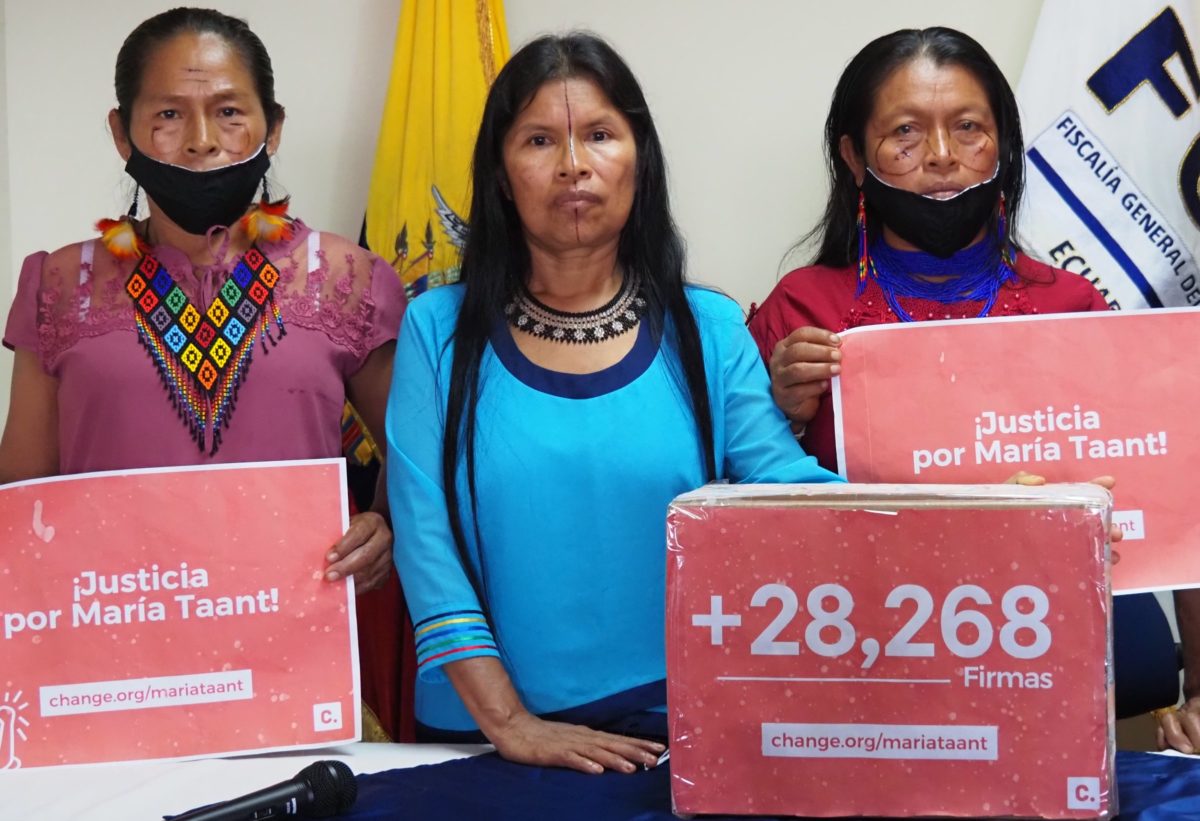
Justice for María Taant
This visit was also an important moment to seek justice for María. Last March, María Taant, Shuar Indigenous women leader, mother, singer, and member of the Mujeres Amazónicas collective was struck by a car and killed on her way home from an award ceremony by the Ombudsman’s Office recognizing the collective’s work for defending the Ecuadorian Amazon.
On March 17, 2022, Mujeres Amazónicas organized a delegation of 15 women to deliver more than 28,000 signatures to the Provincial Prosecutor of Morona Santiago, Anita Madero. The signatures were gathered by Mujeres Amazónicas and Nina Gualinga with support from an international solidarity effort by Amazon Watch and other organizations During the delivery of signatures, several representatives of Mujeres Amazónicas spoke out calling for justice for María Taant. They urged the public prosecutor to investigate until they find the person responsible for this crime.
“We are a group of Amazonian women united with María Taant. She was our friend, our sister, a fighter, and defender of the jungle. It will be a year since the Ombudsman invited María Taant to recognize her work, just like that of other women in our Amazonian villages. She participated in Puyo and was back in her homeland. The car that hit her fled. We want justice for María Taant, a woman who sang and fought. We ask for justice for María Taant. We have lived a year of pain without her,” said Noemí Gualinga, a Kichwa Indigenous woman from Sarayaku and member of Mujeres Amazónicas.
Amazonian women defenders bring myriad solutions to respond to the Amazon tipping point and climate chaos we’re facing. They are the turning point, the light, the joy, and the healers we need to meet this moment. In honor of María and all the Indigenous women defenders on the front lines of resistance to the extractive industries that continue to threaten rights, rivers, rainforests, and our climate, we ask you to recommit your solidarity and your voice with Indigenous women during this women’s month and beyond. Only together can we protect our Mother Earth.


